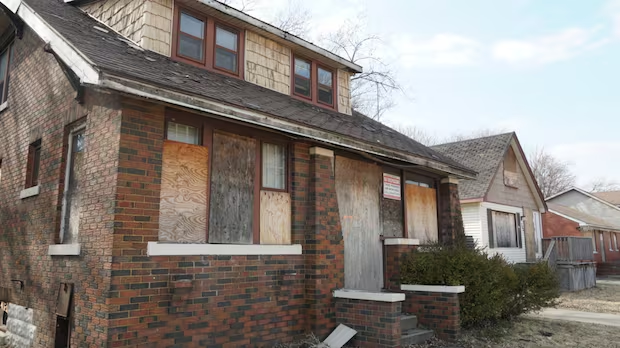Why Windsor buildings can’t be boarded-up unless damaged by fire or severe weather

Listen to this article
Estimated 4 minutes
The audio version of this article is generated by text-to-speech, a technology based on artificial intelligence.
In an attempt to lower the number of boarded-up vacant buildings in Windsor, the city has updated its property standards bylaw.
Rob Vani oversees municipal building inspections. He says, among the tweaks, they’ve cleaned up language clarifying when you can board a vacant building and when you cannot for residential, industrial or commercial spaces.
“Essentially any building that’s not damaged by fire or storm or some other type of natural event cannot be boarded for any reason,” said Vani.
Currently, there are 299 vacant buildings the city’s list with active enforcement actions, he says, 171 of which are residential.
Rob Vani is Windsor’s municipal senior manager of building inspections. (Jason Viau/CBC)
You used to have 120 days to respond to fire damage and remove any boarded up windows and doors. That number has now been pushed back to 182 days — on par with the city’s vacant home tax bylaw, which has a heavy focus on the west end.
In instances where there is vandalism, and a window is broken for example, Vani says fastening a sheet of plywood over it is still allowed, but that now comes with a clear expectation it has to be replaced in a timely manner.
Council voted in favour of the bylaw changes in September. Enforcement began late last month.
“It’s not just for our city … there’s always a vacant buildings, there’s blight. The number is much smaller than it would have been back in 2008 to 2015.”
These moves are also an extension of the city trying to strengthen its core.
According to Vani, the old Boom Boom Room on Ouellette Avenue is a building that had been boarded-up for a long time but has since had the property owner voluntarily take all the plywood off.
“Because of the discussions we had with them about that, these regulations were coming forward,” Vani said.
“We suggested that they be … proactive with opening the front facade of that building. And the hope is he’ll continue to work with his real estate people to find a new tenancy for that building.”
The front entrance of the old Boom Boom Room on Ouellette Avenue in downtown, Windsor, Ont. (Jason Viau/CBC)
Downtown Coun. Renaldo Agostino, who used to run the nightclub, says it was the core’s biggest example of blight.
“From day one, that was the target right to get something done — and we did,” he said.
The Ward 3 representative says the bylaw changes equip the city’s bylaw inspectors with sharper teeth.
“The frustration comes when people don’t respond. This was put in place to make sure that those people understand that if you’re not going to pick up the phone, don’t worry, we’re going to get the work done — and send you the bill.”
Vani says vacant buildings are spread throughout the city with a variety of types of buildings — whether they’re residential, commercial or industrial.
As for ones owned by the Ambassador Bridge, the updated bylaw currently can’t apply for legal reasons.
“Those buildings do all have current orders and those orders are still being litigated through the courts. We’re still waiting for a resolution on those matters before we would be able to apply this new bylaw to those properties.”
Residents in Sandwich say derelict and boarded-up homes are a major concern in the neighbourhood. (Pratyush Dayal/CBC)
Newly minted Ward 2 Coun. Frazier Fathers recently told CBC News boarded-up homes are an “eyesore.”
“It does have a negative perception on the neighbourhood, even for locals… when you see a block where there’s a whole bunch of boarded up or dilapidated homes,” he said in an interview before being elected.
Fathers called them a major concern for two decades in the community of Sandwich Town.
“It creates the broken window effect, where people see one bad thing and they project on the whole neighborhood, which isn’t true at all,” added Fathers, who’s also a housing policy consultant.




